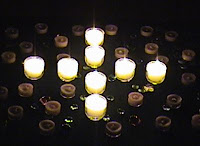
Heard a friend describe his church as a “post-modern, emerging-type church, with lots of symbolism, candles, & coffee.” Got me thinking, which got me looking, which got me questioning…
What is the “Emerging Church?” What makes a church “Emergent?” Is there such a thing as a post-modern “style” of church? If so, is this “style” going to go/already heading towards extinction?
Found THIS ARTICLE by Scot McKnight– great & insightful primer on the “emerging, emergent, post-modern” – deals with the mystique, mythology, misconceptions, & other mis’ses…
excerpt…
Five Streams of the Emerging Church
Key elements of the most controversial and misunderstood movement in the church today.
Scot McKnight | posted 1/19/2007 08:46AM
It is said that emerging Christians confess their faith like mainliners—meaning they say things publicly they don’t really believe. They drink like Southern Baptists—meaning, to adapt some words from Mark Twain, they are teetotalers when it is judicious. They talk like Catholics—meaning they cuss and use naughty words. They evangelize and theologize like the Reformed—meaning they rarely evangelize, yet theologize all the time. They worship like charismatics—meaning with their whole bodies, some parts tattooed. They vote like Episcopalians—meaning they eat, drink, and sleep on their left side. And, they deny the truth—meaning they’ve got a latte-soaked copy of Derrida in their smoke- and beer-stained backpacks.
Along with unfair stereotypes of other traditions, such are the urban legends surrounding the emerging church—one of the most controversial and misunderstood movements today. As a theologian, I have studied the movement and interacted with its key leaders for years—even more, I happily consider myself part of this movement or “conversation.” As an evangelical, I’ve had my concerns, but overall I think what emerging Christians bring to the table is vital for the overall health of the church…

I must answer your question with a question: How many Jack Hayford’s do you see post-moderning? In other words, why is it that more traditional church leaders who are successful (define it how you will) can write books, hold conferences, create systems of church delivery, etc…and when others emulate their style it’s considered wisdom (even if it doesn’t work well for them), and when a new “style” (candles, coffee, new language, etc…) develops, it’s considered suspect & rebellious in some circles. I’d say it’s all about authenticity-don’t adopt a program that’s not really you, regardless of style. If you didn’t do fire, java, & post modern prior to the emerging movement, maybe it’s really not for you :)
Adopting certain activities/props (candles, coffee, & icons) in order to mimic (& hopefully duplicate in #’s, fame, crowd reached) what was happening at Graceland, Axis, &/or The Soliton-ers ends up creating a static model/facsimile of somethiing that is/was a fluid, living breathing, naturally developing organism. & it ends up stinking.
But so do we when we copy the COTW’s… maybe its just more acceptable because there are more people doing it.
It’s more important to know why we’re doing what we’re doing than it is to give it a special name or label. I think that we all know that many people want to label something just so they have a name for the thing they hate; who do you think thought up the term hippies? I’m pretty sure it wasn’t them.
Reminds me of the lyrics on a song on the new Shins CD “Wincing the Night Away”:
“If the old guard still offend/
they’ve got nothing on which you depend/so enlist every ounce/
of your bright blood/
And off with their heads/
Jump from the hook/
You’re not obliged to swallow anything you despise/
See those unrepenting buzzards want your life/
and they got no right/as sure as you’ve got eyes/they’ve got no right.”
Quite a pleasant song.